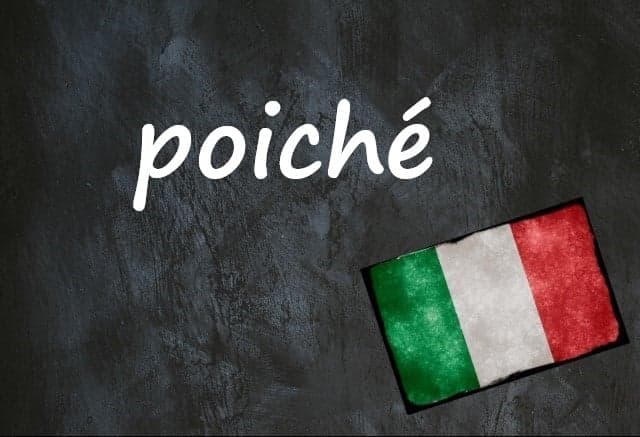Italian word of the day: 'Poiché'

There are a few reasons why you should learn this Italian word.
While the Italian word perché (meaning ‘why’ or ‘because’) is one you’ll learn early on, it has a more confusing cousin - or two.
A reader recently emailed with the following question:
“Is there a difference between perché and poiché? I’ve seen both translated as ‘because’.”
There is a difference - as we’ll try to explain below.
Poiché means “since” or “seeing as”.
- Poiché siamo tutti stanchi, andiamo a dormire.
- Since we’re all tired, let’s go to bed.
Poiché is sometimes mistaken for a more formal synonym of perché. But, while it can be used in a similar way, it’s not quite the same.
Perché is used when both asking and answering questions. As you might know, it can (somewhat confusingly) be translated into English as both 'why' and 'because'.
- Perché non sei a scuola?
- Perché oggi è chiusa
- Why aren’t you at school?
- Because it’s closed today
Poiché is similar to perché in its 'because' form - but it stresses the fact that the answer is a consequence of something.
And it can’t be used in place of the 'why' perché when asking questions.
- Io smetterei di parlare, poiché nessuno mi sta ascoltando.
- I'm going to stop talking, seeing as nobody is listening to me.
As you can see, poiché goes at the beginning of a sentence or clause.
And unlike perché, you’ll rarely hear poiché used in casual conversation. It’s quite formal, and more commonly used in writing; from novels to textbooks, and in Italian language exams.
Less formal alternatives for speech include siccome (since) and dato che (given that). Even the very formal visto che (considering that) is probably more commonly used.
Now that we’ve got the difference between those two sorted out, what about purché?
It’s not a spelling mistake. It means “as long as”, “provided that”, or “only if”.
- Puoi restare qua, purché tu faccia silenzio.
- You can stay here, as long as you’re quiet.
Purché is used to introduce a conditional subordinate clause (in this example, that's the second part of the sentence after the comma) and it's always followed by the subjunctive, or congiuntivo (a mode used to talk about hypothetical future situations, among other things).
That may sound complicated, but eventually you'll find the use of these little Italian words comes naturally - as long as (purché?) you keep practicing.
Do you have a favourite Italian word you'd like us to feature? If so, please email us with your suggestion.
Don't miss any of our Italian words and expressions of the day: download our new app (available on Apple and Android) and then select the Italian Word of the Day in your Notification options via the User button.
Comments (1)
See Also
While the Italian word perché (meaning ‘why’ or ‘because’) is one you’ll learn early on, it has a more confusing cousin - or two.
A reader recently emailed with the following question:
“Is there a difference between perché and poiché? I’ve seen both translated as ‘because’.”
There is a difference - as we’ll try to explain below.
Poiché means “since” or “seeing as”.
- Poiché siamo tutti stanchi, andiamo a dormire.
- Since we’re all tired, let’s go to bed.
Poiché is sometimes mistaken for a more formal synonym of perché. But, while it can be used in a similar way, it’s not quite the same.
Perché is used when both asking and answering questions. As you might know, it can (somewhat confusingly) be translated into English as both 'why' and 'because'.
- Perché non sei a scuola?
- Perché oggi è chiusa
- Why aren’t you at school?
- Because it’s closed today
Poiché is similar to perché in its 'because' form - but it stresses the fact that the answer is a consequence of something.
And it can’t be used in place of the 'why' perché when asking questions.
- Io smetterei di parlare, poiché nessuno mi sta ascoltando.
- I'm going to stop talking, seeing as nobody is listening to me.
As you can see, poiché goes at the beginning of a sentence or clause.
And unlike perché, you’ll rarely hear poiché used in casual conversation. It’s quite formal, and more commonly used in writing; from novels to textbooks, and in Italian language exams.
Less formal alternatives for speech include siccome (since) and dato che (given that). Even the very formal visto che (considering that) is probably more commonly used.
Now that we’ve got the difference between those two sorted out, what about purché?
It’s not a spelling mistake. It means “as long as”, “provided that”, or “only if”.
- Puoi restare qua, purché tu faccia silenzio.
- You can stay here, as long as you’re quiet.
Purché is used to introduce a conditional subordinate clause (in this example, that's the second part of the sentence after the comma) and it's always followed by the subjunctive, or congiuntivo (a mode used to talk about hypothetical future situations, among other things).
That may sound complicated, but eventually you'll find the use of these little Italian words comes naturally - as long as (purché?) you keep practicing.
Do you have a favourite Italian word you'd like us to feature? If so, please email us with your suggestion.
Don't miss any of our Italian words and expressions of the day: download our new app (available on Apple and Android) and then select the Italian Word of the Day in your Notification options via the User button.

Join the conversation in our comments section below. Share your own views and experience and if you have a question or suggestion for our journalists then email us at [email protected].
Please keep comments civil, constructive and on topic – and make sure to read our terms of use before getting involved.
Please log in here to leave a comment.